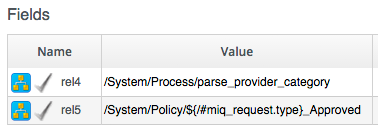Classes, Schemas, Instances & Relationships
Classes
A Class is similar to a template, it contains a generic definition for a set of automation operations. Each Class has a Schema, that defines the variables, states, relationships or methods that Instances of the class will use.
Schemas
A Schema is made up of a number of elements, or fields. A schema often has just one entry - to run a single Method - but in many cases it has several components, for example:

Adding or Editing a Schema
Each field is added or edited in the schema editor by specifying the field Type from a drop-down list...

...and the field Data Type from a drop-down list:

We can define default values for fields in a class schema, which will be inherited by all instances created from the class, but can be optionally over-ridden in the schema of any particular instance.
Instances
An Instance is a specific "clone" of the generic class, and is the entity run by the Automation Engine. An Instance contains a copy of the Class schema but with actual values of the fields filled in.
Relationships
One of the schema field types is Relationship, and these are links to other Instances elsewhere in the Automation Datastore. We often use relationships as a way of chaining Instances together, and relationship values can accept variable substitutions for flexibility, for example:
